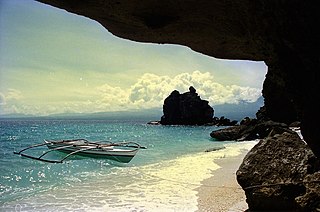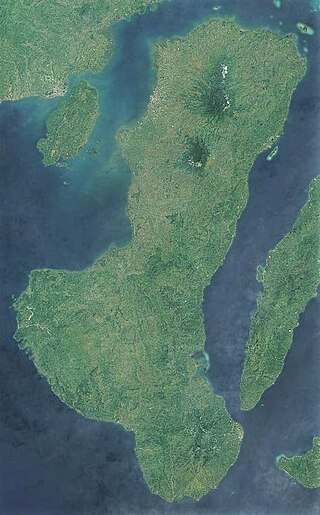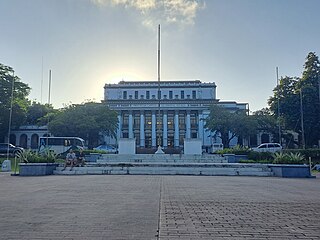
Siquijor, officially the Province of Siquijor, is a Philippine island province located within the Negros Island Region. Its capital is the municipality of Siquijor, Siquijor. The province lies south of Cebu, southeast of Negros Oriental, southwest of Bohol, and north of Mindanao.

Negros Oriental, officially the Province of Negros Oriental, is a province in the Philippines located in the Negros Island Region. Its capital is the city of Dumaguete. It occupies the southeastern half of the large island of Negros, and borders Negros Occidental, which comprises the northwestern half. It also includes Apo Island, a popular dive site for both local and foreign tourists.

Negros Occidental, officially the Province of Negros Occidental, is a province in the Philippines located in the Negros Island Region. Its capital is the city of Bacolod, of which it is geographically situated and grouped under by the Philippine Statistics Authority, but remains politically independent from the provincial government. It occupies the northwestern half of the large island of Negros, and borders Negros Oriental, which comprises the southeastern half. Known as the "Sugarbowl of the Philippines", Negros Occidental produces more than half the nation's sugar output.

Bacolod, officially the City of Bacolod, is a 1st class highly urbanized city in the Negros Island Region in the Philippines. With a total of 600,783 inhabitants as of the 2020 census, it is the most populous city in the Negros Island Region and the second most populous city in the entire Visayas after Cebu City.

Dumaguete, officially the City of Dumaguete, is a 2nd class component city and capital of the province of Negros Oriental, Philippines. According to the 2020 census, it has a population of 134,103 people. It is the most populous city and the smallest city by land area in Negros Oriental.

Valencia, officially the Municipality of Valencia, is a 1st class municipality in the province of Negros Oriental, Philippines. According to the 2020 census, it has a population of 38,733 people.

Negros Oriental State University is a public/state nonsectarian higher education institution in Dumaguete, Philippines. It was founded in 2004 by virtue of RA 9299. It is the only state university in the province of Negros Oriental, Philippines. Its Main Campus is located in Dumaguete and has the most number of academic programs and student organizations. It also has 6 satellite campuses all over the province. Formerly Central Visayas Polytechnic College, it was converted into a state university for students from Visayas and Mindanao.

Mabinay, officially the Municipality of Mabinay, is a 1st class municipality in the province of Negros Oriental, Philippines. According to the 2020 census, it has a population of 82,953 people, making it the most-populous municipality in Negros Oriental.

La Carlota, officially the City of La Carlota,, is a 4th class component city in the province of Negros Occidental, Philippines. According to the 2020 census, it has a population of 66,664 people. making it the least populous city in the province.
In many countries, kilometre zero or similar terms in other languages denote a particular location from which distances are traditionally measured and some use this as their official country location or coordinates for faster search at space satellites, this is also used for measuring distances between different countries around the world. Historically, they were markers where drivers could set their odometers to follow the directions in early roaming guide books.

The Cebu Provincial Capitol is the seat of the provincial government of Cebu in the Philippines. Located at the north end of Osmeña Boulevard in Cebu City, it was designed by Juan M. Arellano, a Filipino architect best known for the Manila Metropolitan Theater (1935), the Legislative Building, and the Manila Central Post Office (1926). An inscription on the central concave portion of its façade reads, "The authority of the government emanates from the people. Erected A.D. MCMXXXVII."

Roel Ragay Degamo was a Filipino politician who served as governor of Negros Oriental from 2011 to June 2022, and again from October 2022 until his assassination on March 4, 2023. He previously served as the province's vice governor from 2010 to 2011, and was a municipal councilor of Siaton from 1998 to 2007.

The 2013 Bohol earthquake occurred on October 15 at in Bohol, an island province located in Central Visayas, Philippines. The magnitude of the earthquake was recorded at 7.2, with epicenter 6 kilometres (3.7 mi) S 24° W of Sagbayan, and its depth of focus was 12 kilometres (7.5 mi). It affected the whole Central Visayas region, particularly Bohol and Cebu. The earthquake was felt in the whole Visayas area and as far as Masbate island in the north and Cotabato provinces in southern Mindanao.

Negros, is the fourth largest and third most populous island in the Philippines, with a total land area of 13,309 km2 (5,139 sq mi). The coastal zone of the southern part of Negros is identified as a site of highest marine biodiversity importance in the Coral Triangle.

The Negros Occidental Provincial Capitol is the seat of the provincial government of Negros Occidental located at Gatuslao St., Bacolod, Philippines. Within its complex is the Capitol Park and Lagoon.

Capitol Central, previously called the Negros Occidental Provincial Capitol Complex, is a government complex and mixed-use estate centered around the Negros Occidental Provincial Capitol, currently co-managed with Ayala Land. Certain portions are leased or sold to Ayala Land, as part of their industrial estate in Bacolod, Philippines.

The Negros Island Region (NIR) is an administrative region in the Philippines. Covering both the islands of Negros and Siquijor, the region is composed of three provinces: Negros Occidental, Negros Oriental, and Siquijor, as well as the highly urbanized city of Bacolod. The regional centers are Bacolod and Dumaguete.

The Casa Real de Iloilo, also known as the Old Iloilo Provincial Capitol, was the seat of the provincial government of Iloilo in the Philippines since the Spanish colonial period until 2006. It also served as the residence of the alcalde-mayor, presidente municipal, or governor, who held the highest authority as the Spanish official in Iloilo during the period.

The Zambales Provincial Building or Zambales Provincial Capitol is the seat of the provincial government of Zambales in the Philippines.

The Bataan Provincial Building, Bataan Provincial Capitol, or The Bunker is the seat of the provincial government of Bataan in the Philippines.




















